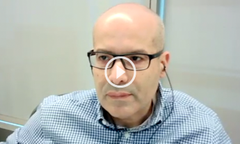
Physicians Consider Possible Outcomes of Treatment in Third-Line CRC
Marwan G. Fakih, MD, discusses topics in metastatic colorectal cancer from the Case-Based Roundtable meeting he moderated.
Episodes in this series

Marwan G. Fakih, MD, a professor in the Department of Medical Oncology & Therapeutics Research, associate director for Clinical Sciences, medical director of the Briskin Center for Clinical Research, division chief of Gastrointestinal Medical Oncology, and codirector of the Gastrointestinal Cancer Program at City of Hope, discusses topics in metastatic colorectal cancer (CRC) from the Case-Based Roundtable meeting he moderated.
The discussion focused on third-line treatment options for metastatic CRC, highlighting the FRESCO-2 trial (NCT04322539) with fruquintinib (Fruzaqla) and the SUNLIGHT trial (NCT04737187) combining bevacizumab (Avastin) plus trifluridine/tipiracil (Lonsurf).
The conversation underscored the unmet need in this patient population, with limited treatment options in the third line. Fakih says there is skepticism about systemic therapy's value and concerns over patients' performance status and quality of life. The emphasis of the event was on improving survival, quality of life, and delaying deterioration in patients' conditions.
TRANSCRIPTION
0:10 | We discussed some randomized phase 3 clinical trials, and we focused on the landscape of treating CRC in the third-line setting after progression on oxaliplatin, fluoropyrimidine, and irinotecan. The studies that specifically we discussed were the FRESCO-2 trial, which focused on fruquintinib. We talked about the SUNLIGHT clinical trial with the combination of bevacizumab and trifluridine in patients with metastatic CRC in the third-line setting. We've also talked about historic clinical trials that led to the approval of regorafenib [Stivarga] and trifluridine[-tipiracil] as monotherapy in the past.
0:56 | I think what is clear from our discussion is that this is an area of unmet need still, and patients with metastatic CRC who progress on 2 lines of treatment have limited options. And there's still, unfortunately, some skepticism about the value of systemic therapy in this population. There's also some concern about the performance status in some of those patients, and if they are able to receive treatments. The main focus that we had yesterday was not just on the improvement in overall survival and progression-free survival, but the impact of treatment on improvement of quality of life, as well as delaying deterioration of quality of life or deterioration of performance status in patients.

























